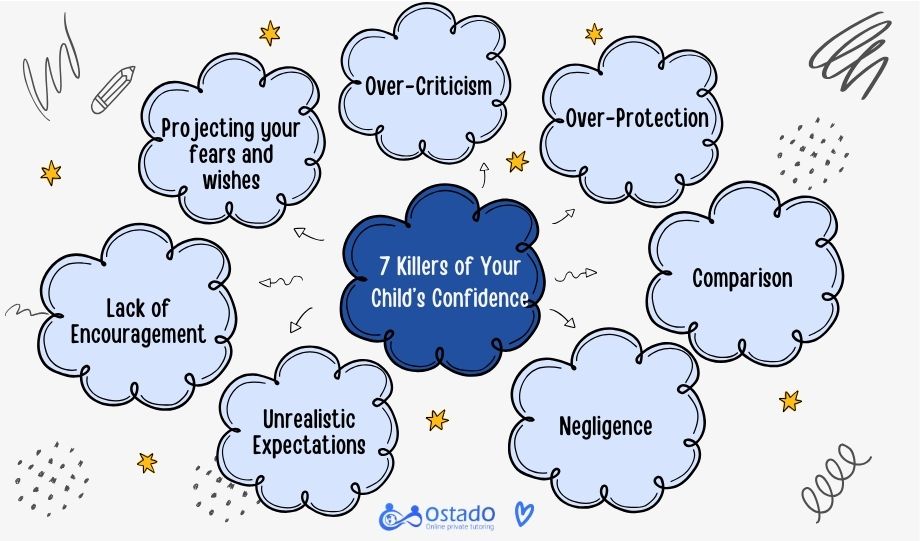Have you ever watched a glassblower blowing their breath through the tube into the molten glass to create something elegant and practical? That’s you whispering into your child’s ears, and your words can crush or bolster their confidence. So, follow these seven tips to nourish your children and empower them with confidence.
1. Over-Criticism: When Feedback Becomes Harmful

There is a fine line between giving feedback and criticising. The common belief is telling what’s right or wrong and sometimes going the extra mile by explaining why.
The three-stage Sandwich Model is a popular approach to giving feedback. You start with a positive comment, gently address the problem, and end the feedback with another positive comment. Let’s go over an example.
“(1)That’s so sweet of you to care for your little brother. (2) Let’s stay out of his way the next time he wants to stand on his feet to see if he can take some steps. (3) I’m sure he appreciates his lovely sister’s assistance.”
You could have simply said, “Honey, let go of your little brother; he can do it himself,” but would it have been as effective as the former feedback?
2. Helicopter Parenting: The Damage of Over-Protection

Mistakes are an essential part of the learning process. Sometimes, these mistakes cause embarrassment, and sometimes they inflict physical pain. After all, it’s how we grow up to become independent adults.
It’s impossible to protect your child from all wrong and consequent harm, and even if it were possible, you would have robbed your children of a first-hand life experience. Your job as a parent is to ensure these mistakes turn into learning opportunities rather than an alibi for oppression.
Instead, let your child deal with their challenges, but be reachable in case they need your assistance. This way, you encourage them to be more independent and become better problem solvers. These ten tips can help you stop overprotecting your child.
3. Comparison: A Fast Track to Low Self-Worth

Despite the many similarities in our needs and desires, every one of us is unique; every one of us can make the world a little more colourful. However, we need to learn that being different is praiseworthy.
When you compare your child to a sibling, a playmate, or anyone else, you convey a message to your child that you want them to be less like themselves and more like others. The comparison makes them feel inadequate and doubt their self-worth.
Instead, celebrate their achievements, and if they’re feeling blue at times, bring up their strengths and try to teach them that not everyone has it all! You can find 7 Ways To Embrace Your Child’s Uniqueness here.
4. Negligence: Dashing Your Child’s Spirit

We all need attention to various degrees, but this need to be seen and appreciated is more vital in children. Drawing a crooked circle with other crooked lines inside is an accomplishment for a child, so celebrate it and recognise their efforts.
Connect, talk and play with your child. This is a common explanation of the scientific term, serve and return. These responsive relationships shape your child’s mind and pave the way for their development and well-being.
5. Projecting Your Fears and Wishes: Burdensome Heritage

You must accept your child’s individuality and free will. Stop trying to make your child an enhanced version of yourself. Your child will more likely become who you are than what you want them to be.
Carl Jung (psychiatrist and psychoanalyst): “Children are educated by what the grown-up is and not by his talk.“
Imposing your fears or desires onto your child may damage their self-esteem, induce anxiety and stress, destroy their sense of self, and eventually impede their emotional development. You can learn more about Parental Projection here.
6. Setting Unrealistic Expectations: The Confidence-Killer

Your expectations from your child should align with your efforts to create an environment where they can (1) find their passion and (2) access the means of realising their talents and potential.
You can ensure your expectations are realistic by talking regularly with your child about their goals and interests. Moreover, age is a substantial factor in setting expectations. Your expectations must align with your child’s capabilities in their developmental stage. Click on How to Set Expectations for Your Kids to learn more.
7. Lack of Encouragement: Unrealised Potentials

Motivation is the fuel for achieving your goals with more convenience. There are many things that children don’t like to try. Maybe it’s a brand new experience that they avoid because it scares them somehow, or it’s something they’ve already tried but didn’t like despite the benefits, like eating vegetables or getting a shot. You can use these 7 Ways to Encourage Your Child to Try New Things.
It’s worth mentioning that strategic self-anticonformity (SSA), more commonly known as reverse psychology, can occasionally be used to encourage your child to do something. When used frequently, it loses force and may even make the child more defiant (reverse reverse psychology).

Additionally, once your child realises that what you’ve pushed them to do is for their benefit, they trust you more and more, which makes your job easier as a parent to help your child spread their wings.
Key Takeaways
To conclude, as a caring parent, you should consider the following:
- Mistakes are learning opportunities; don’t reprimand your child for their mistakes.
- Learn the distinction between feedback and criticism and use each appropriately and adequately.
- Don’t make every decision for your child. Let them explore the life and make their own decisions. Otherwise, they’ll grow dependent.
- Don’t compare your child to others; celebrate their uniqueness and create a nourishing environment where they can be what they want.
- Ask your child’s opinion and let them make decisions around the house. Let them know their ideas matter in talk and action.
- Let your children be what they desire, not what you want them to be.
- Children need the motivation to realise their potential. Learn how to encourage them to achieve what they desire.

